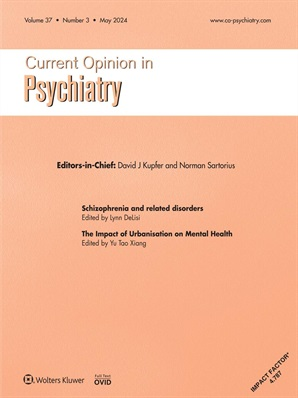Older age bipolar disorder.
IF 7.5
2区 医学
Q1 PSYCHIATRY
引用次数: 0
Abstract
Purpose of review Older age bipolar disorder (OABD) refers to patients with bipolar disorder aged 50 years and over. There is a paucity of evidence-based guidelines specific to OABD, but in recent years, several studies have been published on OABD. The current review synthesizes previous literature (up to January 1, 2021) as well as most recent literature on OABD (since January 1, 2021). Recent findings This review covers the following themes: diagnosis and specifiers, clinical course, psychosocial functioning, cognition, physical comorbidities, and pharmacotherapy. On the basis of the latest data, specific clinical recommendations are proposed for each theme. Summary OABD forms a more complex subgroup of bipolar disorder, with an increased risk of cognitive deficits, physical comorbidities, impaired psychosocial functioning, and premature death. The distinctions between BD-I and BD-II and between EOBD and LOBD do not clinically represent relevant subtypes for OABD patients. Mental healthcare professionals should treat all OABD patients with an integrative care model that takes into account cognitive and physical comorbidities and that contains elements aimed at improvement of psychosocial functioning and quality of life. Older age itself should not be a reason to withhold lithium treatment. Future research should collect data on essential data domains using validated measurement scales.


老年双相情感障碍。
综述目的:老年双相情感障碍(OABD)是指年龄在50岁及以上的双相情感障碍患者。目前缺乏针对OABD的循证指南,但近年来,已经发表了一些关于OABD的研究。本综述综合了之前的文献(截至2021年1月1日)以及最新的关于OABD的文献(自2021年1月1日起)。最新发现:本综述涵盖以下主题:诊断和说明,临床过程,社会心理功能,认知,身体合并症和药物治疗。在最新数据的基础上,针对每个主题提出了具体的临床建议。总结:OABD是双相情感障碍的一个更复杂的亚组,具有认知缺陷、身体合并症、社会心理功能受损和过早死亡的风险增加。BD-I和BD-II以及EOBD和LOBD之间的差异在临床上并不代表OABD患者的相关亚型。精神卫生保健专业人员应采用综合护理模式治疗所有OABD患者,该模式考虑到认知和身体合并症,并包含旨在改善社会心理功能和生活质量的要素。年龄本身不应该成为拒绝锂治疗的理由。未来的研究应使用有效的测量量表收集基本数据域的数据。
本文章由计算机程序翻译,如有差异,请以英文原文为准。
求助全文
约1分钟内获得全文
求助全文
来源期刊

Current Opinion in Psychiatry
医学-精神病学
CiteScore
12.20
自引率
1.40%
发文量
76
审稿时长
6-12 weeks
期刊介绍:
Current Opinion in Psychiatry is an easy-to-digest bimonthly journal covering the most interesting and important advances in the field of psychiatry. Eight sections on mental health disorders including schizophrenia, neurodevelopmental disorders and eating disorders, are presented alongside five area-specific sections, offering an expert evaluation on the most exciting developments in the field.
 求助内容:
求助内容: 应助结果提醒方式:
应助结果提醒方式:


